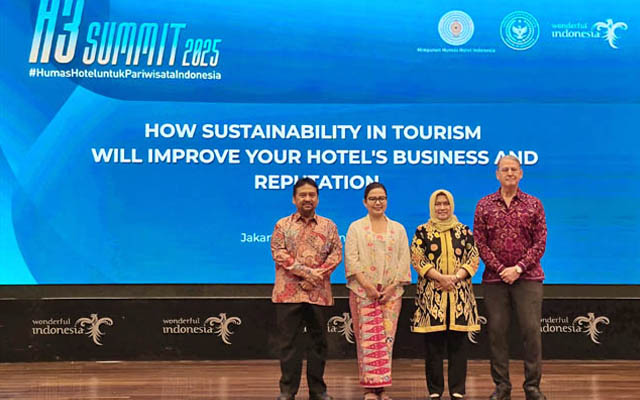
The Indonesia Ministry of Tourism (MoT) intends to prioritise tourism businesses that meet sustainable development goals (SDG) for participation in government-led tourism exhibitions and sales missions. The move supports the industry’s shift toward sustainability and is aligned with the the country’s Nationally Determined Contributions (NDC) targets.
Speaking at H3 Summit organised by the Association of Hotel Public Relations (H3) Indonesia in Jakarta last week, Rizki Handayani, deputy for Industry and Investment of MoT, noted that sustainable tourism was trending along with growing global awareness of environmental issues.

She acknowledged efforts undertaken by tourism business to uphold sustainable practices, and underscored the crucial role hotel public relation professionals play in communicating sustainability programmes to the public.
“The market will look for hotels that meet SDG requirements,” she added.
She believes that the quality of hotel accommodation and services consistently shapes tourists’ first impression of destination Indonesia.
“Therefore, the role of public relations is very important. Hotel public relation professionals must be able to build a positive narrative, not only related to hotel products but also about Indonesian tourism that prioritises sustainable principles,” Rizki said.
As a facilitator of sustainable tourism, MoT will roll out “several programmes supported by international financing” to aid the sector next year.
She added that MoT has implemented various programmes that are aligned with Indonesia’s NDC targets, such as managing food waste and food loss, implementing the Blue, Green, and Circular Economy in hotels, awarding Green Hotel recognition, and developing a hotel supply chain linked to SDG, including the use of local resources.
The NDC targets a reduction in greenhouse gas emissions by 32 per cent through its own efforts or 43 per cent with international support by 2030. It also targets net-zero emissions by 2060 or sooner, management of 70 per cent of waste by 2025, and a per capita reduction in food waste by 35 per cent by 2030.
Yulia Maria, the general chair of H3 Indonesia, echoed the need to advance Indonesian tourism through a focus on achieving and communicating environmental, social, and governance (ESG) goals.
“For this, the role of public relations is crucial, as it allows us to build a positive narrative and help hotels frame sustainability as a genuine commitment rather than just a government obligation to run ESG programmes,” said Yulia.
“We can also educate and engage with guests, encouraging them to participate in eco-friendly initiatives and enhance the hotel’s credibility and reputation through transparent communication. This strengthens public trust and, of course, integrates with the hotel’s branding, which is fundamental to all hotel communication activities.”

















